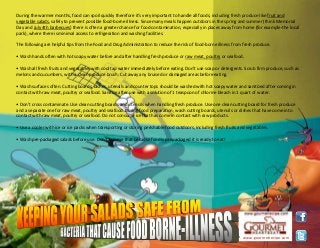
Keeping yours salads safe from bacteria that caused food borne illnesa
- 1. During the warmer months, food can spoil quickly therefore it's very important to handle all foods, including fresh produce like fruit and vegetable salads, safely to prevent possible food-borne illness. Since many meals happen outdoors in the spring and summer (think Memorial Day and July 4th barbecues) there is often a greater chance for food contamination, especially in places away from home (for example-the local park), where there is minimal access to refrigeration and washing facilities. The following are helpful tips from the Food and Drug Administration to reduce the risk of food-borne illness from fresh produce. • Wash hands often with hot soapy water before and after handling fresh produce or raw meat, poultry or seafood. • Wash all fresh fruits and vegetables with cool tap water immediately before eating. Don't use soap or detergents. Scrub firm produce, such as melons and cucumbers, with a clean produce brush. Cut away any bruised or damaged areas before eating. • Wash surfaces often. Cutting boards, dishes, utensils and counter tops should be washed with hot soapy water and sanitized after coming in contact with raw meat, poultry or seafood. Sanitize after use with a solution of 1 teaspoon of chlorine bleach in 1 quart of water. • Don't cross contaminate. Use clean cutting boards and utensils when handling fresh produce. Use one clean cutting board for fresh produce and a separate one for raw meat, poultry and seafood. During food preparation, wash cutting boards, utensils or dishes that have come into contact with raw meat, poultry or seafood. Do not consume ice that has come in contact with raw products. • Use a cooler with ice or ice packs when transporting or storing perishable food outdoors, including fresh fruits and vegetables. • Wash pre-packaged salads before use. Don't assume that because food is prepackaged it is ready to eat! www.gourmetrecipe.com
